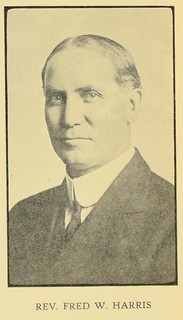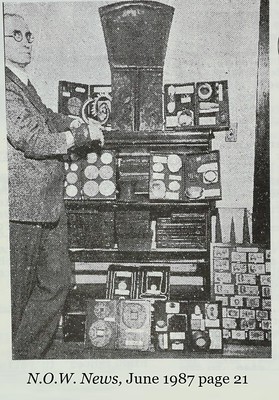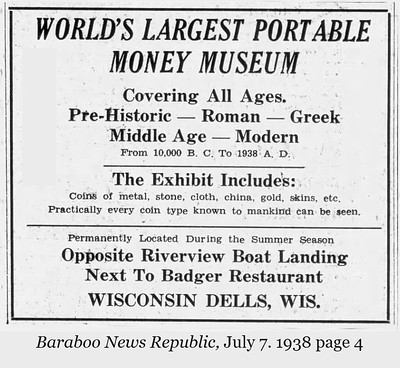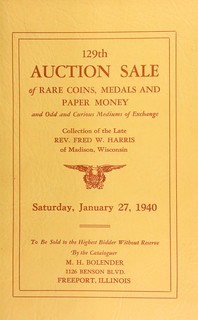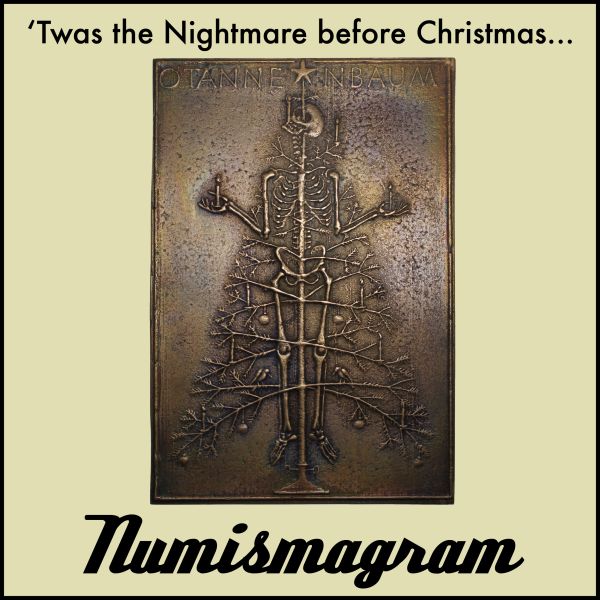
PREV ARTICLE
NEXT ARTICLE
FULL ISSUE
PREV FULL ISSUE
FREDERICK WILLIAM HARRIS (1872-1938)E-Sylum Feature Writer and American Numismatic Biographies author Pete Smith submitted this article on Rev. Fred Harris and the Harris portable money museum. Thanks! -Editor
Frederick William Harris (1872-1938)
This story should begin with his birth on May 23, 1872. There is a record for his Christening at Fenny Compton, England, on June 30, 1872. The 1880 Census shows his family living in Bloomington, Wisconsin, with older siblings born in England and younger sisters born in Wisconsin. This would indicate the family moved to America in late 1872 or early 1873. Perhaps as a good Christian, he was born again because the 1920 and 1930 Census gives his place of birth as Wisconsin. His obituary gives his place of birth as Bagley, Wisconsin. He retained the same parents, John Henry Harris (1843-1909) and Sarah Rachel Print Harris (1843-1922). On August 14, 1889, Fred Harris caught a fourteen-pound blue catfish south of Prairie du Chien. The next morning, he took it into town and sold it to James Harvey for fifteen cents paid with a piece of fifteen cents currency. He saved that piece and built a museum around it. He graduated from Epworth Seminary in Epworth, Iowa, in 1898. He went on to receive a B.A. degree from Lawrence college in Appleton, Wisconsin in 1902, an S. T. B. degree from Boston University School of Theology and his M.A. and Ph.D. from Illinois Wesleyan. Harris married Estelle Maude Barrett Harris (1877-1955) on June 24, 1903. They were the parents of Lawrence Barrett Harris (1905-1962), Dorothy E. Harris (1908-1979), Wilfred J. Harris (1910-1998) and Robert Russell Harris (1915-1993). Harris served as a Methodist pastor in Chippewa Falls from 1909 to 1917. From there he went to Platteville. In 1925 he was appointed district superintendent for the Madison-Platteville area. He retired from the ministry in 1937. Harris joined the A.N.A. on February 1, 1926, as member 2963. He attended the ANA conventions in 1929 and 1936. In 1932, he joined Gordon Gill to form the Madison Coin Club in Wisconsin. Reports of club meetings often mention fewer than ten people in attendance.
In 1936, Harris served on the committee that proposed and promoted the Wisconsin
commemorative half dollar. He was designated as On April 26, 1937, Harris exhibited a 1792 Martha Washington half disme at the Madison Coin Club. I did not find this in the Bolender sale of his collection. He assembled a library of more than 1600 volumes. He collected books on theology, history and numismatics. Harris used his connections to write to Methodist missionaries around the world seeking examples of primitive money. He had an example of every piece of money mentioned in the Bible.
The museum included many small frames that could be shown with smaller or larger exhibits. The format would be different at different locations. As it was described, the entire museum could fill six rooms of a house. The Harris portable money museum operated in the shadow of the popular Chase Bank Money Museum in Manhattan. The Harris collection was described as more extensive than the Chase Museum. The Chase Museum ended up at the Smithsonian. The Harris collection was broken up and sold at auction. During the summer of 1938, his travelling museum settled in Wisconsin Dells opposite the Riverview Boat Landing. With more than 35,000 coins, it was described as the world's largest portable money museum. His claim that the collection covered money back to 10,000 B.C. is a bit of a stretch. He included cuneiform clay tablets he described as predecessors to paper money. Harris died in Madison, Wisconsin, on November 28, 1938. He is buried with his wife at Roselawn Memorial Park in Monona, Wisconsin. For his funeral, six methodist ministers from Madison carried his casket to the grave. In December, the value of his estate was given as $8,500.
Many lots were exhibit cases with multiple items sold as one lot. Lot 272 included 123 Chinese cash coins listed as realizing one-fourth cent. I assume that was per unit and not for the whole lot. In general, coins were circulated rather than preserved in high quality. A 30-pound Yap stone (lot 572) brought $31. Another yap stone (lot 573) at 44 pounds brought $35. I searched for the Indian copper piece shown in one photograph. I suspect that was lot 617 described as Eskimo Thousand Blanket Money, 17 x 30 inches bringing $35. Like Breen's Guinea pig, in my opinion these are not Eskimo and not used as money. That would require a long explanation. I wasn't aware of this "portable money museum" either. Many thanks to Pete for surfacing this and making us all aware of its existence. Important hobby history! Among the odd and curious items are Frog Money (lot 433), Russian Cheese Money (lot 462) and Sole Leather Money (lot 527). The sale also included a great collection of Bryan money (lots 767-856). Do any of our readers have numismatic items or numismatic books traceable back to Fred Harris? -Editor
To read the Bolender catalog on the Newman Numismatic Portal, see:
Wayne Homren, Editor The Numismatic Bibliomania Society is a non-profit organization promoting numismatic literature. See our web site at coinbooks.org. To submit items for publication in The E-Sylum, write to the Editor at this address: whomren@gmail.com To subscribe go to: https://my.binhost.com/lists/listinfo/esylum All Rights Reserved. NBS Home Page Contact the NBS webmaster 
|
